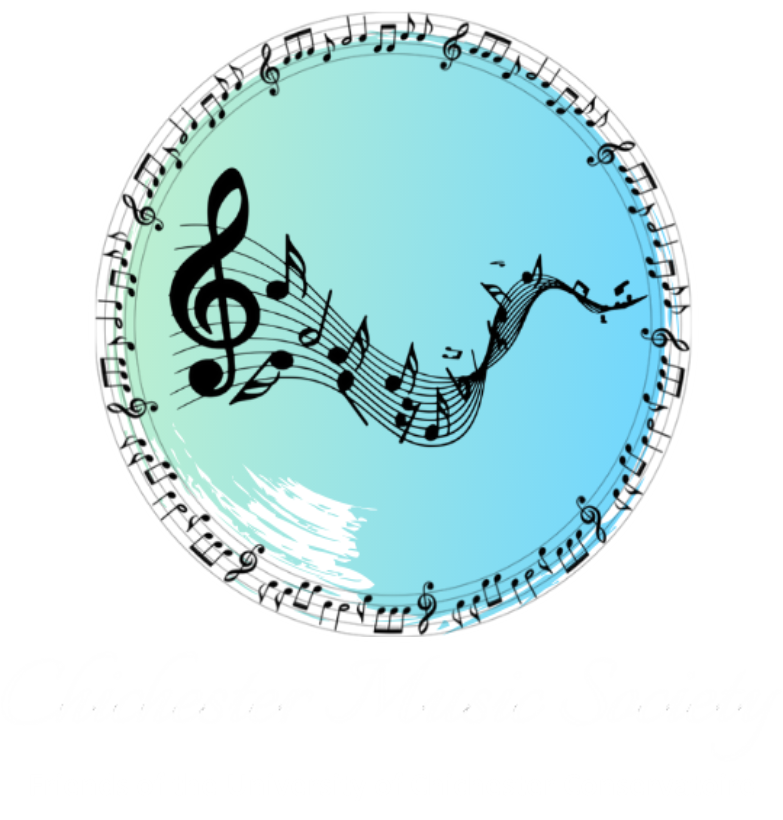Reviews for 2017
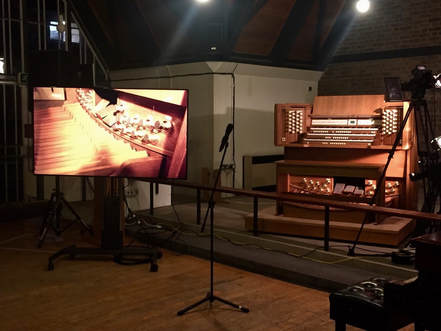
December - Christmas Fundraising Concert
Ben Hall (organ & piano)
and Laura Ritchie (cello)
Funtington Music Group’s Christmas Concert at the University of Chichester on 13 December was in complete contrast to previous years. For a start it was a free extra concert in the annual membership programme, but with the expectation that it would be a fund-raising event for the University’s Music Department’s John Speir Musical Instrument Library. So what better musicians to perform than the Head of Music at the University, Ben Hall, and Laura Ritchie, Professor of Learning and Teaching, also from the University.
Their first piece was Schubert’s Arpeggione Sonata for Piano [Ben Hall] and Cello [Laura Ritchie]. This is one of the most celebrated of Schubert’s later life cello compositions, and both musicians enraptured the audience in a brilliant aural experience of lyricism and tranquillity. In their rendition of the Finale the duo most effectively captured the kaleidoscopic range of emotions that this piece demanded.
Ben Hall then played, as a solo on the Chapel organ, two linked pieces, one by Maurice Durufle, followed by Litanies from Trois Pieces by French composer Jehan Alain, who was so tragically killed by the Nazis when he was only 29. Ben Hall had set up cameras which showed both the organ keyboard and the pedals, which proved to be a welcome addition for the audience who were able more easily to appreciate the intricacies and skills required of the organist.
The concert concluded with a return to the piano and cello. After playing works by Borowski and Bruch, the duo concluded their programme by playing Hungarian Rhapsody by David Popper, a piece that challenges any musician. Laura Ritchie played this with a warmth of tone, and agile finger work, which aptly demonstrated her talent. The sympathetic piano accompaniment, provided by Ben Hall, matched her in both skill and brilliance throughout the piece.
David Tinsley, Chairman of the Funtington Music Group, thanked the two musicians, saying, “It is such a privilege for FMG to have Ben Hall as President and Laura Ritchie as our University Link, both sitting on our Committee and willing to give up their time for free to give us this fabulous concert. We are very privileged.”
Finally, when the donations for the Musical Instrument Library had been added up, David Tinsley was able to confirm that, with Gift Aid, enough had been raised on the night to purchase a viola to complete the set of instruments for a string quartet. This announcement resulted in huge applause from the audience, who had already given such an enthusiastic reception to the two musicians.
Ben Hall (organ & piano)
and Laura Ritchie (cello)
Funtington Music Group’s Christmas Concert at the University of Chichester on 13 December was in complete contrast to previous years. For a start it was a free extra concert in the annual membership programme, but with the expectation that it would be a fund-raising event for the University’s Music Department’s John Speir Musical Instrument Library. So what better musicians to perform than the Head of Music at the University, Ben Hall, and Laura Ritchie, Professor of Learning and Teaching, also from the University.
Their first piece was Schubert’s Arpeggione Sonata for Piano [Ben Hall] and Cello [Laura Ritchie]. This is one of the most celebrated of Schubert’s later life cello compositions, and both musicians enraptured the audience in a brilliant aural experience of lyricism and tranquillity. In their rendition of the Finale the duo most effectively captured the kaleidoscopic range of emotions that this piece demanded.
Ben Hall then played, as a solo on the Chapel organ, two linked pieces, one by Maurice Durufle, followed by Litanies from Trois Pieces by French composer Jehan Alain, who was so tragically killed by the Nazis when he was only 29. Ben Hall had set up cameras which showed both the organ keyboard and the pedals, which proved to be a welcome addition for the audience who were able more easily to appreciate the intricacies and skills required of the organist.
The concert concluded with a return to the piano and cello. After playing works by Borowski and Bruch, the duo concluded their programme by playing Hungarian Rhapsody by David Popper, a piece that challenges any musician. Laura Ritchie played this with a warmth of tone, and agile finger work, which aptly demonstrated her talent. The sympathetic piano accompaniment, provided by Ben Hall, matched her in both skill and brilliance throughout the piece.
David Tinsley, Chairman of the Funtington Music Group, thanked the two musicians, saying, “It is such a privilege for FMG to have Ben Hall as President and Laura Ritchie as our University Link, both sitting on our Committee and willing to give up their time for free to give us this fabulous concert. We are very privileged.”
Finally, when the donations for the Musical Instrument Library had been added up, David Tinsley was able to confirm that, with Gift Aid, enough had been raised on the night to purchase a viola to complete the set of instruments for a string quartet. This announcement resulted in huge applause from the audience, who had already given such an enthusiastic reception to the two musicians.
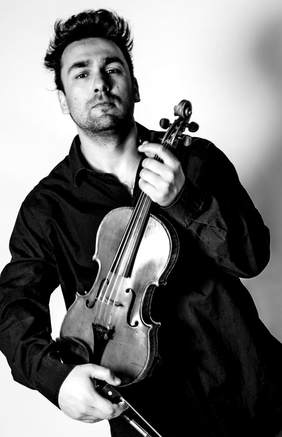
November
Bogdan Vacarescu (violin)
and Julian Jacobson (piano)
The Funtington Music Group at the University of Chichester on 8 November welcomed back Bogdan Vacarescu, the internationally acclaimed violinist, accompanied by virtuoso pianist Julian Jacobson.
The concert opened with a polished and accomplished performance of Beethoven’s Violin Sonata No 7, Opus 30, No.2. This was a well-constructed and perfectly balanced delivery of this Beethoven masterpiece and a perfect introduction to the two musicians. The palette of colours they created was varied and polished, and they gave serious energetic shape to the virtuoso ending, underpinned by phenomenal precision.
The concert programme was designed for variety and contrast, and it ranged from a performance of Preludium and Allegro, by Pugnani-Kreisler, a piece that opened like a funeral held amid moodily ringing church bells, but finished on a virtuoso flourish. In complete and utter contrast the musicians then went on to perform the calm and so well-known Ave Maria by Schubert.
The first half ended with a piece by a little known composer Pablo de Sarasate, who himself was at the turn of the 20th Century both of gypsy extraction and a stunning violinist. This composition, Caprice Basque, Opus 24 was in this mould and Bogdan brought just the right amount of vigorous sharp-edged playing that was polished and animated, full of subtle and contrasting moods and speed.
Julian Jacobson had ably accompanied Bogdan in the first half with real innate sensitivity, professional authority, and with alert responsiveness to the mood of the moment. He now played as a piano solo Prokofiev’s “Stalingrad” Sonata No 7 in Bb Opus 83. He successfully introduced in the first movement that feeling of dread and distress to come. The actual finale ended in a crashing, dissonant, but ultimately triumphant conclusion. An admirable tour-de force.
Amongst the final pieces, played by both musicians, was a performance of Julian’s own composition Orang-u-Tango, a piece moving from a languorous beginning to a hurly-burly conclusion. The final musical genres then went from Central European, with Bogdan’s own Romanian heritage to the fore, to lilting 1930s style romantic music, and finally, in their encore, a tribute to Gershwin.
As David Tinsley, Chairman of the Funtington Music Group, said, “What an amazing concert! Two fantastic virtuoso musicians at the top of their game playing diverse and interesting music. This concert was an absolute delight.”
Bogdan Vacarescu (violin)
and Julian Jacobson (piano)
The Funtington Music Group at the University of Chichester on 8 November welcomed back Bogdan Vacarescu, the internationally acclaimed violinist, accompanied by virtuoso pianist Julian Jacobson.
The concert opened with a polished and accomplished performance of Beethoven’s Violin Sonata No 7, Opus 30, No.2. This was a well-constructed and perfectly balanced delivery of this Beethoven masterpiece and a perfect introduction to the two musicians. The palette of colours they created was varied and polished, and they gave serious energetic shape to the virtuoso ending, underpinned by phenomenal precision.
The concert programme was designed for variety and contrast, and it ranged from a performance of Preludium and Allegro, by Pugnani-Kreisler, a piece that opened like a funeral held amid moodily ringing church bells, but finished on a virtuoso flourish. In complete and utter contrast the musicians then went on to perform the calm and so well-known Ave Maria by Schubert.
The first half ended with a piece by a little known composer Pablo de Sarasate, who himself was at the turn of the 20th Century both of gypsy extraction and a stunning violinist. This composition, Caprice Basque, Opus 24 was in this mould and Bogdan brought just the right amount of vigorous sharp-edged playing that was polished and animated, full of subtle and contrasting moods and speed.
Julian Jacobson had ably accompanied Bogdan in the first half with real innate sensitivity, professional authority, and with alert responsiveness to the mood of the moment. He now played as a piano solo Prokofiev’s “Stalingrad” Sonata No 7 in Bb Opus 83. He successfully introduced in the first movement that feeling of dread and distress to come. The actual finale ended in a crashing, dissonant, but ultimately triumphant conclusion. An admirable tour-de force.
Amongst the final pieces, played by both musicians, was a performance of Julian’s own composition Orang-u-Tango, a piece moving from a languorous beginning to a hurly-burly conclusion. The final musical genres then went from Central European, with Bogdan’s own Romanian heritage to the fore, to lilting 1930s style romantic music, and finally, in their encore, a tribute to Gershwin.
As David Tinsley, Chairman of the Funtington Music Group, said, “What an amazing concert! Two fantastic virtuoso musicians at the top of their game playing diverse and interesting music. This concert was an absolute delight.”
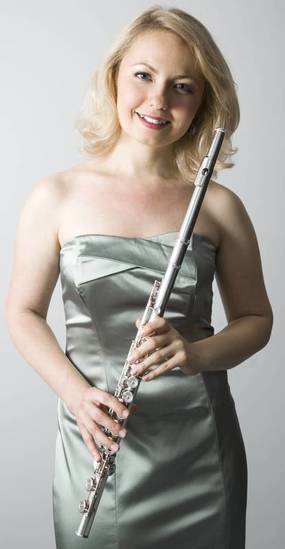
October
Alena Walentin (flute)
and Pavel Timofeyesky (piano)
Two emerging musicians of talent, Alena Walentin [flute] and Pavel Timofeyesky [piano], both eminent prize winners in their own fields, played at the Funtington Music Group’s 11th October Concert at the University of Chichester.
Their programme was divided between works by lesser known composers along with more well-known works. They opened with a delightful sonata by Czech composer Erwin Schulhoff, which demands a combination of delicacy and energy, and this proved to be an excellent introductory choice, as the piece allows both musicians to portray their personality and outstanding musical skills.
Their second piece was Nocturne et Allegro Scherzando for flute and piano by Philippe Gaubert, a 20th Century French composer. This was a delightful, skittish and boisterous composition at times, yet it included romantic and lyrical layers, particularly in the Nocturne, which was much enjoyed by the audience.
The final piece before the interval was Chaconne for Flute and Piano by Tomas Vitali. Although normally played on the violin, the arrangement in this case by Alena Walentin for flute was a joy, bringing the work into the 21st Century. This is one of Alena’s favourite pieces, and the result showed to perfection both musicians playfulness and subtle lyricism, combined with superb technical fluidity. They had worked together for six years and Pavel’s understated and expressive accompanying was outstanding.
A Flute solo and two piano solos by Liszt and Ravel followed the interval. Pavel played to perfection Ravel’s intricate and demanding Alborada Del Gracioso. This piece is technically very challenging and was beautifully executed by Pavel.
The final piece was by Prokofiev, his Sonata for piano and flute. The duo chose to play this at a daringly fast tempo, but the music still shone wonderfully through, combining its wry humour, with sudden bursts of romanticism mingling beautifully. As it is so technically demanding, it is musically exciting, and Alena and Pavel were exceptional. They showed a subtle combination of delicacy and sensitivity with energy and technical brilliance that this composition demands.
David Tinsley, Chairman of Funtington Music Group, said, “We had such a marvellous evening. Two amazing young musicians, generously playing two encores, won the affection of the audience with their outstanding musical expertise. We were pleased too to welcome many students who told me they were inspired by these exceptional performances. A special evening to remember.”
Alena Walentin (flute)
and Pavel Timofeyesky (piano)
Two emerging musicians of talent, Alena Walentin [flute] and Pavel Timofeyesky [piano], both eminent prize winners in their own fields, played at the Funtington Music Group’s 11th October Concert at the University of Chichester.
Their programme was divided between works by lesser known composers along with more well-known works. They opened with a delightful sonata by Czech composer Erwin Schulhoff, which demands a combination of delicacy and energy, and this proved to be an excellent introductory choice, as the piece allows both musicians to portray their personality and outstanding musical skills.
Their second piece was Nocturne et Allegro Scherzando for flute and piano by Philippe Gaubert, a 20th Century French composer. This was a delightful, skittish and boisterous composition at times, yet it included romantic and lyrical layers, particularly in the Nocturne, which was much enjoyed by the audience.
The final piece before the interval was Chaconne for Flute and Piano by Tomas Vitali. Although normally played on the violin, the arrangement in this case by Alena Walentin for flute was a joy, bringing the work into the 21st Century. This is one of Alena’s favourite pieces, and the result showed to perfection both musicians playfulness and subtle lyricism, combined with superb technical fluidity. They had worked together for six years and Pavel’s understated and expressive accompanying was outstanding.
A Flute solo and two piano solos by Liszt and Ravel followed the interval. Pavel played to perfection Ravel’s intricate and demanding Alborada Del Gracioso. This piece is technically very challenging and was beautifully executed by Pavel.
The final piece was by Prokofiev, his Sonata for piano and flute. The duo chose to play this at a daringly fast tempo, but the music still shone wonderfully through, combining its wry humour, with sudden bursts of romanticism mingling beautifully. As it is so technically demanding, it is musically exciting, and Alena and Pavel were exceptional. They showed a subtle combination of delicacy and sensitivity with energy and technical brilliance that this composition demands.
David Tinsley, Chairman of Funtington Music Group, said, “We had such a marvellous evening. Two amazing young musicians, generously playing two encores, won the affection of the audience with their outstanding musical expertise. We were pleased too to welcome many students who told me they were inspired by these exceptional performances. A special evening to remember.”
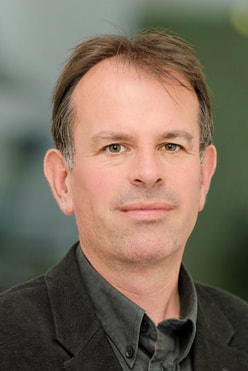
September
Roy Stratford
The Funtington Music Group’s Autumn Season opened with a welcome return of Roy Stratford on 13 September at the University of Chichester. Roy has had wide experience as a lecture-recitalist, and he charmed the audience before the interval with a fascinating dissection of J S Bach’s Goldberg Variations, followed by a sparkling concert performance of the work on the University’s delightful Steinway Model D grand piano.
The Goldberg Variations begin with an aria, then thirty variations, followed by an aria da capo. Roy Stratford engaged with the audience, right from the start, by asking them to sing in two groups the famous French song Frere Jacques. This type of repetition he explained was the basic principle behind Bach’s variations, and it also allows the artist huge freedom in how he interprets the music. As he explained, in interesting detail, this work, perhaps the greatest of all Bach’s compositions, is an anthology of different styles, moods and musical colours.
After the interval Roy Stratford began to play, starting with the slow introduction played at a leisurely pace. And then the mood changed and one could hardly understand how the pianist could keep up the breakneck speed that the composer requires. Roy Stratford managed these transitions impeccably, not least in those thrilling sections where the pianist is required to cross one hand over the other in rapid fire succession.
This landmark work is a show-piece for keyboard virtuosity and variety. Roy Stratford, with intense conviction, brought out the diverse flavours of the music, whether languorous and slow, or witty and dynamic. The audience appreciated the performance with great applause.
David Tinsley, Chairman of the Funtington Music Group, said, “We were so pleased to invite Roy Stratford back, and tonight’s concert proves what a fantastic lecturer, teacher and pianist Roy is. This was an outstanding performance.”
Roy Stratford
The Funtington Music Group’s Autumn Season opened with a welcome return of Roy Stratford on 13 September at the University of Chichester. Roy has had wide experience as a lecture-recitalist, and he charmed the audience before the interval with a fascinating dissection of J S Bach’s Goldberg Variations, followed by a sparkling concert performance of the work on the University’s delightful Steinway Model D grand piano.
The Goldberg Variations begin with an aria, then thirty variations, followed by an aria da capo. Roy Stratford engaged with the audience, right from the start, by asking them to sing in two groups the famous French song Frere Jacques. This type of repetition he explained was the basic principle behind Bach’s variations, and it also allows the artist huge freedom in how he interprets the music. As he explained, in interesting detail, this work, perhaps the greatest of all Bach’s compositions, is an anthology of different styles, moods and musical colours.
After the interval Roy Stratford began to play, starting with the slow introduction played at a leisurely pace. And then the mood changed and one could hardly understand how the pianist could keep up the breakneck speed that the composer requires. Roy Stratford managed these transitions impeccably, not least in those thrilling sections where the pianist is required to cross one hand over the other in rapid fire succession.
This landmark work is a show-piece for keyboard virtuosity and variety. Roy Stratford, with intense conviction, brought out the diverse flavours of the music, whether languorous and slow, or witty and dynamic. The audience appreciated the performance with great applause.
David Tinsley, Chairman of the Funtington Music Group, said, “We were so pleased to invite Roy Stratford back, and tonight’s concert proves what a fantastic lecturer, teacher and pianist Roy is. This was an outstanding performance.”
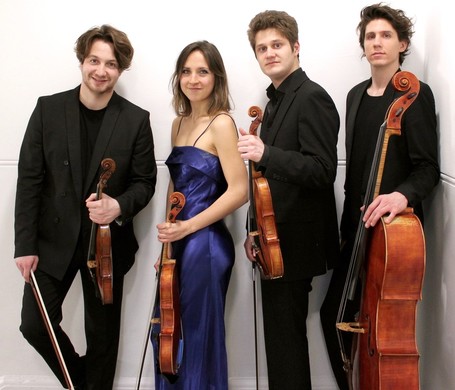
June
Ruisi String Quartet
The Funtington Music Group’s Summer Buffet Concert marked the Group’s 25th Anniversary on 14 June at the University of Chichester. The Group were pleased to welcome the dynamic young Ruisi String Quartet, which was enthusiastically received.
The concert opened with a flawless performance of Haydn’s String Quartet in C Major Opus 20/2. The Quartet was totally in command of the variety and individuality of each movement. Their interpretation was intuitive and their playing was precise, perfectly balanced with a finale that was outstanding, combining technical prowess with a profound sense of style.
They then went on to play an assured performance of Schubert’s String Quartet No 10 in E Flat Major. Most impressive was the confidence with which the piece was played, undaunted by the considerable technical challenges of the music.
In complete contrast after the interval, when a superb buffet supper had been served, the Ruisi offered a colourful and jaunty rendition on Benjamin Britten’s Three Divertimenti.
The concert concluded with an exquisite performance of Debussy’s String Quartet in G Minor. The First Movement was played with a sense of freedom enthused with joy as the Quartet developed its various themes and moods. The playing of the pizzicatos, in the Second Movement, gave the movement a fantastic sense of energy that showed to the full the Quartet’s ability to develop the dynamic contrast, which the music of Debussy demands.
The Final Movement featured great balance between the players and was a very convincing conclusion to a magnificent performance which was very much appreciated by the audience.
David Tinsley, Chairman of the Funtington Music Group, said, “What a wonderful way to celebrate the Funtington Music Group’s 25th Anniversary with such talented musicians, who obviously enjoy playing together. The Ruisi Quartet has given us a real treat, and we will remember this evening for a long time to come.”
Ruisi String Quartet
The Funtington Music Group’s Summer Buffet Concert marked the Group’s 25th Anniversary on 14 June at the University of Chichester. The Group were pleased to welcome the dynamic young Ruisi String Quartet, which was enthusiastically received.
The concert opened with a flawless performance of Haydn’s String Quartet in C Major Opus 20/2. The Quartet was totally in command of the variety and individuality of each movement. Their interpretation was intuitive and their playing was precise, perfectly balanced with a finale that was outstanding, combining technical prowess with a profound sense of style.
They then went on to play an assured performance of Schubert’s String Quartet No 10 in E Flat Major. Most impressive was the confidence with which the piece was played, undaunted by the considerable technical challenges of the music.
In complete contrast after the interval, when a superb buffet supper had been served, the Ruisi offered a colourful and jaunty rendition on Benjamin Britten’s Three Divertimenti.
The concert concluded with an exquisite performance of Debussy’s String Quartet in G Minor. The First Movement was played with a sense of freedom enthused with joy as the Quartet developed its various themes and moods. The playing of the pizzicatos, in the Second Movement, gave the movement a fantastic sense of energy that showed to the full the Quartet’s ability to develop the dynamic contrast, which the music of Debussy demands.
The Final Movement featured great balance between the players and was a very convincing conclusion to a magnificent performance which was very much appreciated by the audience.
David Tinsley, Chairman of the Funtington Music Group, said, “What a wonderful way to celebrate the Funtington Music Group’s 25th Anniversary with such talented musicians, who obviously enjoy playing together. The Ruisi Quartet has given us a real treat, and we will remember this evening for a long time to come.”
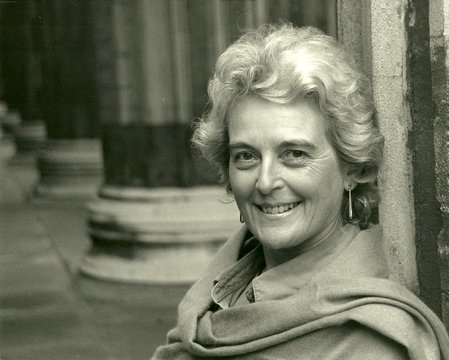
May
Lynden Cranham and Friends
The Funtington Music Group was in for an unexpected treat when Lynden Cranham presented her Exploration of the Life and Times of Nineteenth Century Cellist, Robert Lindley, at the University of Chichester on 10 May. Lindley, a remarkable musician, described even as a teenager as a “musical wonder”, played with all the famous composers of his age, such as Mendelssohn at George IV’s coronation and even Paganini in his later years. His extemporisations were the making of legends.
Lynden Cranham explained how influential he was in the world of music, being first mentioned in the press when he was only 12, and then going on to found the Philharmonia Society, only retiring aged 75 in 1851, the year of the Great Exhibition.
Robert Lindley was also a composer and the Quartet, comprising family members, Emma Parker [violin], Thomas Parker [cello], and Simon Lane [piano], with Lynden Cranham [cello], played two contrasting pieces from his repertoire, showing his transition from a composer so clearly influenced by Mozart, to the second piece, which was much more 19th Century.
The first half concluded with a tranquil and melodic performance of the Adagio Cantabile from Paganini’s Terzetto Concertante for violin, cello and piano.
After the interval the concert continued with a Chamber Trio by William Sterndale Bennett, who was a contemporary of Lindley. Here the accompaniment of the piano was sensitive with at times intricate, accurate dexterity. The Finale was played by all the musicians with consummate, effortless poise.
The final piece was Mozart’s Piano Quartet in E Flat Major KV 478. In fact the first movement had been played at the beginning of the concert, following, as Lynden Cranham, mentioned the 18th Century tradition of so doing, but also as it made such an appropriate and joyful introduction to the evening. The final two movements were equally well-received by the audience, as the music of the second movement, shaded in delicacy, emerged into the expressive warm colours of the finale.
David Tinsley, Chairman of the Funtington Music Group, said, “What a delightful evening, with such exquisite playing. Such an interesting story, with some marvellous anecdotes and a fascinating musical programme. We had a really enjoyable musical experience.”
Lynden Cranham and Friends
The Funtington Music Group was in for an unexpected treat when Lynden Cranham presented her Exploration of the Life and Times of Nineteenth Century Cellist, Robert Lindley, at the University of Chichester on 10 May. Lindley, a remarkable musician, described even as a teenager as a “musical wonder”, played with all the famous composers of his age, such as Mendelssohn at George IV’s coronation and even Paganini in his later years. His extemporisations were the making of legends.
Lynden Cranham explained how influential he was in the world of music, being first mentioned in the press when he was only 12, and then going on to found the Philharmonia Society, only retiring aged 75 in 1851, the year of the Great Exhibition.
Robert Lindley was also a composer and the Quartet, comprising family members, Emma Parker [violin], Thomas Parker [cello], and Simon Lane [piano], with Lynden Cranham [cello], played two contrasting pieces from his repertoire, showing his transition from a composer so clearly influenced by Mozart, to the second piece, which was much more 19th Century.
The first half concluded with a tranquil and melodic performance of the Adagio Cantabile from Paganini’s Terzetto Concertante for violin, cello and piano.
After the interval the concert continued with a Chamber Trio by William Sterndale Bennett, who was a contemporary of Lindley. Here the accompaniment of the piano was sensitive with at times intricate, accurate dexterity. The Finale was played by all the musicians with consummate, effortless poise.
The final piece was Mozart’s Piano Quartet in E Flat Major KV 478. In fact the first movement had been played at the beginning of the concert, following, as Lynden Cranham, mentioned the 18th Century tradition of so doing, but also as it made such an appropriate and joyful introduction to the evening. The final two movements were equally well-received by the audience, as the music of the second movement, shaded in delicacy, emerged into the expressive warm colours of the finale.
David Tinsley, Chairman of the Funtington Music Group, said, “What a delightful evening, with such exquisite playing. Such an interesting story, with some marvellous anecdotes and a fascinating musical programme. We had a really enjoyable musical experience.”
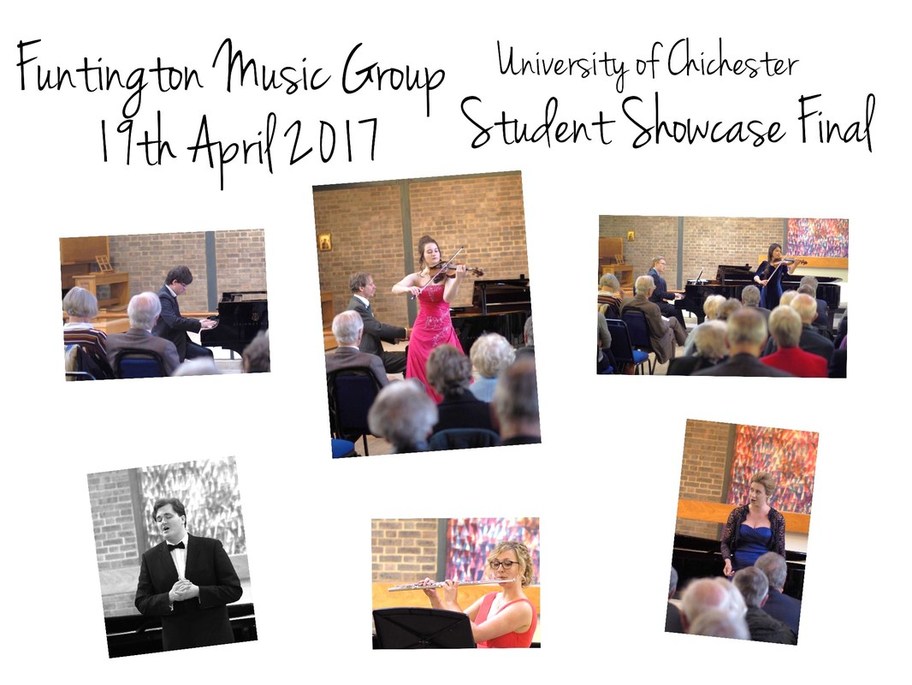
First Prize Goes to Zenia Malteva!
The fourteenth annual University Student Showcase concert on 19th April once again provided an excellent opportunity for Chichester University music undergraduates to demonstrate their versatile musical accomplishments. Twenty three aspiring applicants were auditioned for six places to perform before the discerning FMG audience, augmented by parents and student friends in the gallery.
The evening’s adjudicator was Richard Crozier, an experienced music teacher and County Music Inspector who joined the Associated Board of the Royal Schools of Music in 1995. Few in the audience would have wished to take on the difficult task of selecting the top prizewinners in this talented group of musicians!
Winner of the top prize of £500, violinist Zenia Malteva, delighted the audience with two pieces by Wieniawski, the first soulful with a soaring melody, the second dramatic, rythmical and brilliant. Second prize of £350 went to Simon Arthurs, piano, for his well-chosen programme, revealing playing which was by turns poised, sensitive, heartfelt, then full of energy and conviction. The third prize of £250 was awarded to Taisia Sandetcasia, violin, for an accomplished performance contrasting lightness of touch in Haydn with deeply felt and sonorous playing in the Bruch concerto.
The runners up were Sophie Hermon Taylor, who gave us well characterized performances of Mozart and Verdi arias; John Twitchen, tenor with sensitive performances of songs by Schumann, Britten, Warlock and Ravel; and flautist Georgina Beal, whose pure tone and excellent phrasing in Franz Doppler’s exhibition piece rounded off a splendid evening of musical delights. Each of these performances received £50.
Vice-Chancellor Professor Clive Behagg thanked FMG for helping the University to invest in the future of its students. He said that he was “outragously proud” of the students who had made a wonderful evening for everyone. Standards continued to rise each year and this year the performances had been “breathtaking”. Professor Behagg retires at the end of April so this is his last Showcase, he joked that he thought it about time he moved on, after 41 years service to the University! FMG would like to take this opportunity to thank him for all his support and wish him the very the best for the future.
The fourteenth annual University Student Showcase concert on 19th April once again provided an excellent opportunity for Chichester University music undergraduates to demonstrate their versatile musical accomplishments. Twenty three aspiring applicants were auditioned for six places to perform before the discerning FMG audience, augmented by parents and student friends in the gallery.
The evening’s adjudicator was Richard Crozier, an experienced music teacher and County Music Inspector who joined the Associated Board of the Royal Schools of Music in 1995. Few in the audience would have wished to take on the difficult task of selecting the top prizewinners in this talented group of musicians!
Winner of the top prize of £500, violinist Zenia Malteva, delighted the audience with two pieces by Wieniawski, the first soulful with a soaring melody, the second dramatic, rythmical and brilliant. Second prize of £350 went to Simon Arthurs, piano, for his well-chosen programme, revealing playing which was by turns poised, sensitive, heartfelt, then full of energy and conviction. The third prize of £250 was awarded to Taisia Sandetcasia, violin, for an accomplished performance contrasting lightness of touch in Haydn with deeply felt and sonorous playing in the Bruch concerto.
The runners up were Sophie Hermon Taylor, who gave us well characterized performances of Mozart and Verdi arias; John Twitchen, tenor with sensitive performances of songs by Schumann, Britten, Warlock and Ravel; and flautist Georgina Beal, whose pure tone and excellent phrasing in Franz Doppler’s exhibition piece rounded off a splendid evening of musical delights. Each of these performances received £50.
Vice-Chancellor Professor Clive Behagg thanked FMG for helping the University to invest in the future of its students. He said that he was “outragously proud” of the students who had made a wonderful evening for everyone. Standards continued to rise each year and this year the performances had been “breathtaking”. Professor Behagg retires at the end of April so this is his last Showcase, he joked that he thought it about time he moved on, after 41 years service to the University! FMG would like to take this opportunity to thank him for all his support and wish him the very the best for the future.
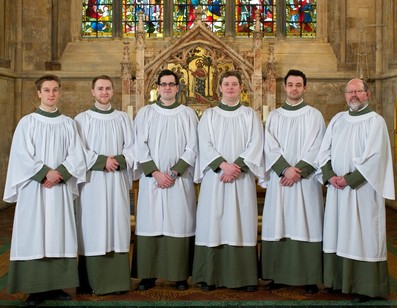
March
Timothy Ravalde with the
Lay Vicars of Chichester Cathedral
The Funtington Music Group has been meeting at the University of Chichester for 13 years, but 8 March was the first time that they had invited the Chichester Cathedral Lay Vicars, under the direction of Timothy Ravalde, Assistant Organist of Chichester Cathedral, to give a concert entitled The Art of A Capella Singing.
Timothy Ravalde had created a fascinating and chronological programme, which told the story of the development of A Capella singing from the 14th Century through to the present day, with illustrated examples of pieces that became more and more complicated as time passed.
He managed to slip in many unusual facts, such as, for instance, the dangerous ecclesiastical challenges facing composers such as Thomas Tallis in the Tudor period. All composers had to manoeuvre extremely carefully between Catholic and Protestant regimes, so that they were not accused of treachery to the monarch’s religious faith at the time. Timothy Ravalde pointed out that William Byrd, for instance, sailed on occasion very close to the wind, and he was probably only saved by his personal friendship with Queen Elizabeth.
The six male singers performed ten examples, such as Thomas Tallis’ Lamentations of Jeremiah. The Ensemble included two altos, two tenors and two bases, and they proved first class across the board, technically accurate, nuanced and expressive. This concert was an outstanding example of fine musicianship, and clever vocal treatments. Their singing was fresh, polished and committed, and the programme was notable for its seamless blend of harmonies, and finely weighted balance.
At the end of the evening, the audience showed their enjoyment with appreciative applause, and David Tinsley, Chairman of Funtington Music Group, summed up by saying, “This was a wonderful evening, and it is so good to listen to six singers, all professional in their own right, achieving such polished harmony, so unified, rich and smooth.”
Timothy Ravalde with the
Lay Vicars of Chichester Cathedral
The Funtington Music Group has been meeting at the University of Chichester for 13 years, but 8 March was the first time that they had invited the Chichester Cathedral Lay Vicars, under the direction of Timothy Ravalde, Assistant Organist of Chichester Cathedral, to give a concert entitled The Art of A Capella Singing.
Timothy Ravalde had created a fascinating and chronological programme, which told the story of the development of A Capella singing from the 14th Century through to the present day, with illustrated examples of pieces that became more and more complicated as time passed.
He managed to slip in many unusual facts, such as, for instance, the dangerous ecclesiastical challenges facing composers such as Thomas Tallis in the Tudor period. All composers had to manoeuvre extremely carefully between Catholic and Protestant regimes, so that they were not accused of treachery to the monarch’s religious faith at the time. Timothy Ravalde pointed out that William Byrd, for instance, sailed on occasion very close to the wind, and he was probably only saved by his personal friendship with Queen Elizabeth.
The six male singers performed ten examples, such as Thomas Tallis’ Lamentations of Jeremiah. The Ensemble included two altos, two tenors and two bases, and they proved first class across the board, technically accurate, nuanced and expressive. This concert was an outstanding example of fine musicianship, and clever vocal treatments. Their singing was fresh, polished and committed, and the programme was notable for its seamless blend of harmonies, and finely weighted balance.
At the end of the evening, the audience showed their enjoyment with appreciative applause, and David Tinsley, Chairman of Funtington Music Group, summed up by saying, “This was a wonderful evening, and it is so good to listen to six singers, all professional in their own right, achieving such polished harmony, so unified, rich and smooth.”
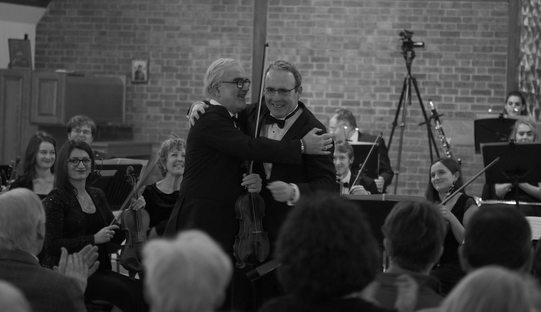 Zoltan Takacs & Crispin Ward
Zoltan Takacs & Crispin Ward
February
University of Chichester Chamber Orchestra & Soloists
February’s Funtington Music Group concert given by the University of Chichester Chamber Orchestra and friends, proved to be an outstanding event. The Chamber Orchestra, now in its 13th year, conducted by Crispin Ward and Nathaniel Roff, gave compelling and highly accomplished performances of works by British and Hungarian composers and supported two international virtuosi, Zoltán Takács (violin) and Piers Adams (recorder).
The Chamber Orchestra opened the evening with the Fantasia on Greensleeves, by Ralph Vaughan Williams, conducted by Nathaniel Roff. A fine flute solo and sensitive playing from the strings set the scene for an evening during which the audience enjoyed much unforced, natural musicality. The Romanian Dances of Bela Bartok followed. Here, the Orchestra’s violins showed excellent articulation and ensemble. There was a real Hungarian feel to the piece, especially the violin solo in the third dance. The Orchestra responded to Roff’s conducting with energy and enthusisiam.
Crispin Ward introduced and conducted Vaughan Williams Lark Ascending, written in 1914, with the poem by George Meredith from which it takes its title. Zoltán Takács realized the piece wonderfully, his violin rising and soaring, the playing delicate, sensitive yet animated, standing out from the background yet part of the overall musical texture. The Orchestra, generally restrained but expansive where appropriate, included distinguished support from woodwind and brass. Finally, left on its own, the solo violin faded into the clear blue sky. A heartfelt performance.
Following the interval, Zoltán Takács revealed the more extrovert side of his musical personality with Bartok’s 1st Rhapsody for Violin and Orchestra. Rich in folk melodies and harmonies, the rhythmic vitality of the piece was energetically realized by both soloist and orchestra.
A sparkling passage for the strings introduced the Concerto for Recorder by David Bedford. Written in 1994 for tonight’s soloist, Piers Adams, this highly imaginative piece requires the soloist to play five different recorders during its 18 minutes, sometimes playing two instruments at once! Moving from bass to increasingly high treble instruments the soloist conveyed a wide emotional range, the intensity and anguish of the middle section giving way to increasingly animated and rhythmical music, hurling the soloist towards to its brilliant conclusion. Piers Adams displayed virtuosity of the first order in this piece that makes great demands of the soloist, giving barely enough time to draw breath, let alone deliver the tonging and fingering required. Simply a tour de force!
At the end of a concert brimming with musical delights came Vaughan Williams English Folk Song Suite. This provided the Chamber Orchestra with the perfect opportunity to display their wide-ranging talents, under the baton of Nathaniel Roff. All sections played brilliantly with fine solos throughout from woodwind and brass players, and excellent playing from the cellos and basses in My Bonny Boy. The final Song from Somerset was wonderfully bright and brash, the music propelled along under a strong impulse to a rousing conclusion!
David Tinsley, Chairman of the Funtington Music Group, thanked everyone, distinguished soloists and orchestra, for a wonderful evening. He said that the concert had been a resounding pleasure for all, including the wonderful orchestra who had so obviously enjoyed playing for us. This was music making at its best!
University of Chichester Chamber Orchestra & Soloists
February’s Funtington Music Group concert given by the University of Chichester Chamber Orchestra and friends, proved to be an outstanding event. The Chamber Orchestra, now in its 13th year, conducted by Crispin Ward and Nathaniel Roff, gave compelling and highly accomplished performances of works by British and Hungarian composers and supported two international virtuosi, Zoltán Takács (violin) and Piers Adams (recorder).
The Chamber Orchestra opened the evening with the Fantasia on Greensleeves, by Ralph Vaughan Williams, conducted by Nathaniel Roff. A fine flute solo and sensitive playing from the strings set the scene for an evening during which the audience enjoyed much unforced, natural musicality. The Romanian Dances of Bela Bartok followed. Here, the Orchestra’s violins showed excellent articulation and ensemble. There was a real Hungarian feel to the piece, especially the violin solo in the third dance. The Orchestra responded to Roff’s conducting with energy and enthusisiam.
Crispin Ward introduced and conducted Vaughan Williams Lark Ascending, written in 1914, with the poem by George Meredith from which it takes its title. Zoltán Takács realized the piece wonderfully, his violin rising and soaring, the playing delicate, sensitive yet animated, standing out from the background yet part of the overall musical texture. The Orchestra, generally restrained but expansive where appropriate, included distinguished support from woodwind and brass. Finally, left on its own, the solo violin faded into the clear blue sky. A heartfelt performance.
Following the interval, Zoltán Takács revealed the more extrovert side of his musical personality with Bartok’s 1st Rhapsody for Violin and Orchestra. Rich in folk melodies and harmonies, the rhythmic vitality of the piece was energetically realized by both soloist and orchestra.
A sparkling passage for the strings introduced the Concerto for Recorder by David Bedford. Written in 1994 for tonight’s soloist, Piers Adams, this highly imaginative piece requires the soloist to play five different recorders during its 18 minutes, sometimes playing two instruments at once! Moving from bass to increasingly high treble instruments the soloist conveyed a wide emotional range, the intensity and anguish of the middle section giving way to increasingly animated and rhythmical music, hurling the soloist towards to its brilliant conclusion. Piers Adams displayed virtuosity of the first order in this piece that makes great demands of the soloist, giving barely enough time to draw breath, let alone deliver the tonging and fingering required. Simply a tour de force!
At the end of a concert brimming with musical delights came Vaughan Williams English Folk Song Suite. This provided the Chamber Orchestra with the perfect opportunity to display their wide-ranging talents, under the baton of Nathaniel Roff. All sections played brilliantly with fine solos throughout from woodwind and brass players, and excellent playing from the cellos and basses in My Bonny Boy. The final Song from Somerset was wonderfully bright and brash, the music propelled along under a strong impulse to a rousing conclusion!
David Tinsley, Chairman of the Funtington Music Group, thanked everyone, distinguished soloists and orchestra, for a wonderful evening. He said that the concert had been a resounding pleasure for all, including the wonderful orchestra who had so obviously enjoyed playing for us. This was music making at its best!
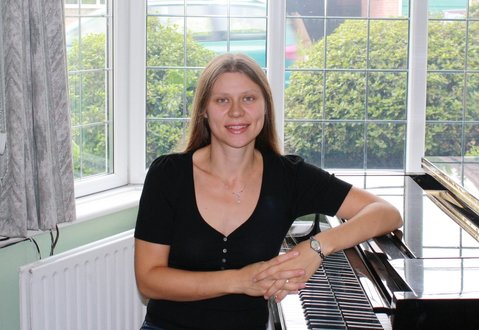
January - Tanya Ursova
Tanya Ursova, the Ukrainian concert pianist, was warmly welcomed back by the Funtington Music Group for the opening of their New Season Concert Programme on 11 January at the University of Chichester.
Tanya Ursova introduced the “muses” behind the foremost Russian composers from Tchaikovsky to Shostakovich, and then she played numerous extracts from their repertoire illustrating the mood of the composer at the time of writing.
Starting with Tchaikovsky she chose to play some to the “Seasons” Opus 37a which were composed at a time when Tchaikovsky was not in one of his regular moods of despair. Noteworthy was Tanya’s interpretation of the month of November where, after the melancholy month January, she beautifully brought to life, with a sense of delicacy and vitality, the sound of sleigh bells and the contrasting atmosphere of a Russian winter.
Her second composer was Alexander Scriabin. Tanya intuitively brought out the composer’s sense of excess and rapture in her performance of a number of the Six Preludes which were composed during the middle of a particular love affair. Here the music moved from dreamy romance to a crashing crescendo. She created a sensitive performance ranging from tenderness to fire, all combined with dynamic expertise and technical precision.
After a stunning performance of Polichinelle by Rachmaninov, she reinforced the audience’s enthusiastic view that she was a very talented musician, who could play a wide variety of musical genres, including the joking, boisterous range of dynamics that this particular piece required of the pianist.
Returning after the interval and moving on to Prokofiev, she chose to play the third movement of his Sonata No 6. Here she ably created an expansive and romantic experience with this movement. She had previously explained to the audience that this sonata was inspired by the composer’s love affair and new “muse” Eleanora. The concert concluded with two pieces from Shostakovich, including the Prelude and Fugue in B Flat Minor Opus 87 No 21. These preludes are perfect for a pianist to demonstrate technical and expressive talent, and Tanya Ursova did not disappoint in her concluding piece.
David Tinsley, Chairman of The Funtington Music Group, said, “Tanya is a talented and creative pianist, with a wide and erudite knowledge of Russian music and she has entertained and educated us royally this evening. What a remarkable performance both on the piano and as an entertaining speaker.”
Tanya Ursova, the Ukrainian concert pianist, was warmly welcomed back by the Funtington Music Group for the opening of their New Season Concert Programme on 11 January at the University of Chichester.
Tanya Ursova introduced the “muses” behind the foremost Russian composers from Tchaikovsky to Shostakovich, and then she played numerous extracts from their repertoire illustrating the mood of the composer at the time of writing.
Starting with Tchaikovsky she chose to play some to the “Seasons” Opus 37a which were composed at a time when Tchaikovsky was not in one of his regular moods of despair. Noteworthy was Tanya’s interpretation of the month of November where, after the melancholy month January, she beautifully brought to life, with a sense of delicacy and vitality, the sound of sleigh bells and the contrasting atmosphere of a Russian winter.
Her second composer was Alexander Scriabin. Tanya intuitively brought out the composer’s sense of excess and rapture in her performance of a number of the Six Preludes which were composed during the middle of a particular love affair. Here the music moved from dreamy romance to a crashing crescendo. She created a sensitive performance ranging from tenderness to fire, all combined with dynamic expertise and technical precision.
After a stunning performance of Polichinelle by Rachmaninov, she reinforced the audience’s enthusiastic view that she was a very talented musician, who could play a wide variety of musical genres, including the joking, boisterous range of dynamics that this particular piece required of the pianist.
Returning after the interval and moving on to Prokofiev, she chose to play the third movement of his Sonata No 6. Here she ably created an expansive and romantic experience with this movement. She had previously explained to the audience that this sonata was inspired by the composer’s love affair and new “muse” Eleanora. The concert concluded with two pieces from Shostakovich, including the Prelude and Fugue in B Flat Minor Opus 87 No 21. These preludes are perfect for a pianist to demonstrate technical and expressive talent, and Tanya Ursova did not disappoint in her concluding piece.
David Tinsley, Chairman of The Funtington Music Group, said, “Tanya is a talented and creative pianist, with a wide and erudite knowledge of Russian music and she has entertained and educated us royally this evening. What a remarkable performance both on the piano and as an entertaining speaker.”

